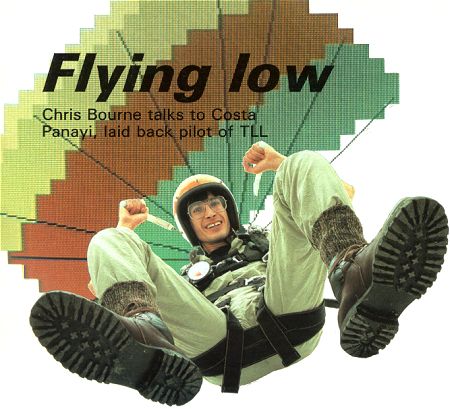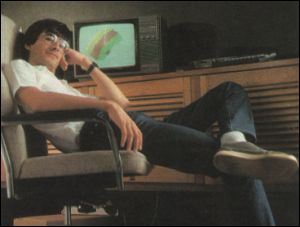| Hit Squad |

In contrast to the concept of whirling motion suggested by its name, Vortex Software is as laid-back an outfit as you are likely to find in the frenetic software industry.
The company is very much a family business. Brothers Costa and Crete Panayi handle programming and advertising respectively while brother-in-law Luke Andrews concentrates on administration and finance. Greek Cypriots by ancestry, the strong emphasis placed in Greek culture on family ties and loyalty serves the brothers well in their business enterprise.
The founder of the company was Costa, the programmer. As often happens in the industry, the other brothers were brought in later as the operation grew more professional and required their particular talents.
Costa's first introduction to programming was at the University of Salford, where he took a Fortran course as part of his degree in Mechanical Engineering. At first Costa was more interested in the machinery than the programming of computers, and wanted to buy a kit. "I fancied a UK101, but I couldn't afford it. Then the ZX-81 appeared, and as soon as I saw the ad I ordered it. I had to wait three months before it arrived."
By now Costa was working as a an engineer for British Aerospace, and a number of his colleagues at work were also excited by the new machine. "We had bets on which one would arrive first. Mine was last. There were about half a dozen of us, and we swapped programs at work."
It was on the ZX-81 that Costa learned Basic, and the first few programs he wrote were in collaboration with his friend at work, Paul Canter. They sent off their first tape to Michael Orwin, of Orwin Software. "It was a collection of programs, Mastermind, Pontoon, Othello and Awari. We were quite chuffed. You wouldn't believe it, he's still sending us money."
At the time, however, Costa had no intention of quitting design engineering, his chosen career. Besides, he was still learning how to program, teaching himself machine code from books.
"The 1K machine was really useful for learning how to be efficient. To begin with it was difficult to see how you could write games."
Costa began by writing routines instead, mainly connected with screen displays. The scrolling techniques he developed were later used in Cosmos, now known as Astral Convoy. He and Canter set up Vortex Software and decided to sell it themselves.
The timing was atrocious. Suddenly the Spectrum appeared on the scene and sales of Cosmos went flat as pitta bread. They quickly converted the game to the 16K Spectrum, including sound and colour feature, and, deterred by their initial experience, licensed the game to another company.
Costa then began work on Android One, and it was at that time that his brother-in-law Luke became involved. "It was a natural progression for Vortex," Luke explains, who is a craft teacher. "I'd handled money working as a teacher and I used to have my own furniture-making company." Crete Panayi had already helped Costa with the advertising side, drawing on his experience working for an advertising agency and his knowledge of design.
Costa's games can easily be seen as a progression of ideas, developing concepts from game to game. The original scrolling technique developed on the ZX-81 in 1K have formed a major feature of all Vortex games, along with other ideas such as 3D effects and large playing areas. Although the original routines are no longer recognisable in the latest products, the development of the style has been a continuous process.
"For Android One we tried to produce a game with a lot of features. We used the scrolling techniques to produce a long corridor, and designed a few rooms, then tried to get something running about the screen." It seems a slap-happy technique to design a game while writing it, putting together chunks of old routine and working out the possibilities, but that is one view of the process by which Costa writes games. "We try to look at the trends" he says. The idea for TLL came simply from the popularity of Flight Simulation, although the game bears no resemblance whatsoever to the Psion program.
Android One became a popular success, and was accepted for retail by W H Smith. The sequel, Android Two, takes the action further using a considerably expanded playing area. The object of the game is to move around a maze-like park destroying blue millipoids.
"I wanted to do a sequel which had something special about it. That's why I developed the 3D effect. It was our first 48K game, and took me 9 months to write. It was released just before Christmas 1983."
Nine months is an enormous length of time to produce an arcade game, but it must be remembered that all the time Costa was still working for British Aerospace. The game itself caused problems, as the ideas Costa was putting into practice were highly ambitious.
"The game became so complex" he says. "The millipoids caused problems. Most people use dark backgrounds but we decided to use the BRIGHT colours. The other thing was the wraparound maze."
The long haul was certainly worth it. Lurid is the only word to describe those background colours - there is an almost tangible feeling of poisonous heat about the game.

"I was tempted to do Android Three," says Costa laconically, threatening further horrors in his metal world of mayhem. "But I decided to leave it for another day."
"TLL is really a progression of the ideas in Android Two. I expanded on the 3D landscape, making the wrap-around more complex. There is an extra dimension as the plane isn't always on the ground."
TLL was one of the big hits of the summer, with superb graphics of buildings. "It's easier to get into TLL than Android Two" suggests Luke Andrews. "My best score is 34,125. We always like to make each game something of an adventure. There is a sort of Vortex cult. For instance, we don't tell you everything about TLL on the cassette insert."
An example of that is the fact that you can fly under bridges and telephone lines in TLL, which at first simply look like obstacles to be avoided. The first time you go under the bridge the 3D aspect of the game really opens up and you see the plane duck under and out of the other side. Costa himself is particularly proud of the shadow which the plane casts. When you fly over a building the shadow climbs up the wall, which, if you think about it, means suddenly it has to move faster than the plane to keep up. "It took a bit of doing that," says Costa, smiling quietly.
The brothers are a quiet spoken trio and Luke is very sanguine about the problems suffered by the software industry of which we read so much in the computer press.
"Garages are going bust all the time" says Luke. "People don't mention that. Software houses have matured a great deal, but we still regard ourselves as beginning. If we haven't got the money for something then we don't do it. We haven't drawn a penny out of the account yet for ourselves."
That situation is likely to change in the near future as the company plans to move into a real office - at present it still operates from the front room of Luke's house in a leafy Manchester suburb. Costa left British Aerospace earlier in the summer to devote himself full-time to programming, and thus will require a living from the business.
Vortex has appeared to be happily isolated from some of the problems faced by other companies, partly because of its policy of never borrowing money, and partly because it has released so few titles and yet managed to sustain a loyal following. "We can't be doing too badly" says Luke. "People tell us we're in a slump. Yet in this depressed period TLL has consistently been in the top five since its release. Too many people say it's a seasonal thing, but people still want software in the summer."
If Vortex as a business takes few risks and aims for consistency of quality rather than a high profile and a galaxy of quick-money instant games, Costa himself takes risks of a different kind. "A guy at work in his early sixties did a parachute jump and then put up a notice daring everybody else to copy Granddad," he explains.
Costa and a group of friends went to Langer Airfield in Nottinghamshire, home of the British Parachute School, to try their hand. "The first jump was over a weekend, you get a day's training and then you do your jump on the Sunday. Once that's done you try to get as many as you can in order to be able to go freefall."
"I've never seen him so enthusiastic about anything before" says Luke. "It's a fantastic sensation" says Costa, and goes into reveries about the joy of jumping out of aeroplanes. Wasn't it just a bit scary? "The night before the first jump was worse" says Costa. "But once you've got your kit on you don't think about it.
Costa is unlikely to be getting much time for parachuting over the next few weeks, as he is busy working on the new game, Cyclone. The promised move to a new office will therefore be delayed until the game is completed, so it is likely to be one of the last programs Costa writes by himself, as the new plans include creating a design team to work around him, producing two or three games a year for a range of machines. That may seem a small quantity, but it is more than Vortex has been producing over the past three years.
The way the games are created, with nobody at all sure what Costa's final version is going to involve until it happens, means that the team is understandably reticent about describing Cyclone. Luke explains that even the advertising causes problems, as they genuinely do not know what the game will include when the advertisements have to be placed. Hence the mysterious shadowy Tornado in the TLL ads, about the only thing that was certain about the game at the time.
Cyclone however will be another flying game, but with a much bigger playing area than TLL.
"Watch out for innovations" says Luke, mysteriously. "I can guarantee that. And the weather will play a central part."
Jim Bacon meets the space pirates? Michael Fish versus Pacman? At any rate, the game is due to be released at the end of October, and Vortex is certainly looking for a Christmas hit with Cyclone.
It seems that while the gales blow around them, and other businesses rock and even crumble under the force of 'natural market pressures', Vortex stays cool - the calm spot at the centre of the whirlwind.